home > articles > Christology > Was Jesus Ignorant?
Was Jesus Ignorant? It is argued that Jesus as God Incarnate sometimes only operated out of limited human knowledge! Written by Dr Andrew Corbett, President of ICI Theological College Australia, and author of the popular commentary on the Book of Revelation- The Most Embarrassing Book In The Bible, December 29th 2011
 Take a Bible College Course on Jesus Christ (called “Christology”) and eventually you will study the incarnation of Christ and explore how His Divine and Human natures formed a union. The mystery of how God became man is further magnified when it is supposed that although Christ possessed all of the Divine attributes (immutability, eternality, omniscience, omnipresence, omnipotence) He was at times not utilising His divine nature and instead speaking from His limited Human nature. In this way, it is argued, Christ was actually ignorant of certain things. The most common proof-text to support this doctrine is Matthew 24:36-
Take a Bible College Course on Jesus Christ (called “Christology”) and eventually you will study the incarnation of Christ and explore how His Divine and Human natures formed a union. The mystery of how God became man is further magnified when it is supposed that although Christ possessed all of the Divine attributes (immutability, eternality, omniscience, omnipresence, omnipotence) He was at times not utilising His divine nature and instead speaking from His limited Human nature. In this way, it is argued, Christ was actually ignorant of certain things. The most common proof-text to support this doctrine is Matthew 24:36-
¶ “But concerning that day and hour no one knows, not even the angels of heaven, nor the Son, but the Father only.”
Matthew 24:36
This verse is similarly stated in the Gospel of Mark (13:32). On the surface it appears that Christ is pleading ignorant about the timing of His parousia (“coming”). If so, how could an omniscient Being be ignorant of anything? This apparent conundrum is resolved by appealing to Christ’s two natures (Divine and Human) and reasoning that there this is an instance when Christ spoke from His human nature (limited in knowledge) rather than His Divine nature (omniscient). But this explanation creates more problems than it attempts to solve. Respected Bible Commentator, Adam Clarke, who published his commentary on the Bible between 1810-1826, recognized the weakness of this “two natures” explanation-
This clause is not found either in Matthew or Luke; and Ambrose says it was wanting in some Greek copies in his time. To me it is utterly unaccountable, how Jesus, who knew so correctly all the particulars which he here lays down, and which were to a jot and tittle verified by the event-how he who knew that not one stone should be left on another, should be ignorant of the day and hour when this should be done, though Daniel, Dan. ix. 24, &c., could fix the very year, not less than five hundred years before it happened: how he in whom the fullness of the Godhead dwelt bodily, and all the treasures of wisdom and knowledge, should not know this small matter, I cannot comprehend, but on this ground, that the Deity which dwelt in the man Christ Jesus might, at one time, communicate less of the knowledge of futurity to him than at another. However, I strongly suspect that the clause was not originally in this Gospel. Its not being found in the parallel places in the other evangelists is, in my opinion, a strong presumption against it.
Adam Clarke
Adam Clarke makes an astute exegetical observation that is too frequently overlooked or ignored by others. It is supposed that Christ has just spent the better part of Matthew 24 describing the events leading up to His parousia and in particular when it would happen – then He sweeps it all away with verse 36 and says that He doesn’t really know when it would happen! It should be obvious that there are more problems created than solved by claiming that Christ switched between His Human and Divine consciousnesses. It is an unnecessary and clumsy attempt to make sense of this statement, “nor the Son”.
CHRIST’S DIVINE NATURE
When the Second Person of the Trinity became man (John 1:14), He laid aside His glory but not His divinity. This is called the kenosis (“the emptying” Philippians 2:7). Thus, even in Christ’s incarnation He could exercise divine prerogatives (such as- control over nature, reading the thoughts of others, multiplying food) and receive divine honour such as worship and prayerful petitions.
As Christ pre-incarnate, He was not only omniscient and omnipotent, but also omnipresent. As Christ incarnate He obviously retained the former two traits but His human body was not omnipresent (although arguably Christ, the Logos, mysteriously maintained this during His incarnation). Christ’s humanity meant that He experienced human limitations while maintaining His divinity. He could thirst, hunger, and tire (John 19:28; Matt. 4:2; John 4:6).
Similarly, it is reasoned that the omniscient Christ could be “ignorant” if He chose to be – by only using His human consciousness. This idea is largely based on these dubious “nor the Son” passages (Matt. 24:36; Mark 13:32). But Luke 2:52 (¶ And Jesus increased in wisdom and in stature, and in favour with God and with people) is also cited to support the idea that Jesus alternated between His Divine and Human natures when it came to knowing or not knowing certain things. But this verse should not be used to support this theory because it simply refers to Christ growing in a normal human fashion, not that He was ignorant.
This apparent tension between Christ’s Divine and Human natures was the basis of the Council of Chalcedon (451 A.D.) which determined that Christ had one unique nature that did not diminish either His divine or human nature. They admitted that this was a mystery and called it the Hyperstatic Union of Christ. This Council’s Creedal Statement has generally been accepted by all sectors of the Church. But the implications of this Statement rule out the notion that Christ had some kind of split-personality.
ONLY THE FATHER “KNOWS”
Adam Clarke’s simple explanation was that “nor the Son” does not appear in any the ancient Gospel accounts lends itself most naturally to conform to orthodox, Biblical theology about Christ. Some have realised that even if this variant text was accepted as part of the original Canon, it creates an additional Pneumatological (the study of the Holy Spirit) problem since it must not only be conceded that the Son was ignorant of certain things, because of the statement “only the Father knows”, then the Holy Spirit must similarly be ignorant! While Christ’s apparent ignorance could be clumsily explained away by appealing to His two ‘minds’ (human or divine), the same trick cannot be applied to the Holy Spirit!
Once again, Adam Clarke offers a very natural and simple solution to this conundrum. He cites the work of Dr. Macknight. The word “know” in this verse is not the usual “ginosko” (such as Mark 13:29; Luke 19:44), rather it is the word, “eido”.
But Dr. Macknight, and others, solve this difficulty in the following manner. They suppose the verb oiden to have the force of the Hebrew conjugation hiphel, in which verbs are taken in a causative, declarative, or permissive sense; and that it means here, make known, or promulge, as it is to be understood in 1 Cor. ii. 2. This intimates that this secret was not to be made known, either by men or angels, no, not even by the Son of man himself; but it should be made known by the Father only, in the execution of the purposes of his justice. I am afraid this only cuts the knot, but does not untie it.
What Dr. Macknight is pointing out is that the word ginosko tends to be used of know by general knowledge and the word eido is used of know because you’ve been authorized to be told. That is, in Matthew 24:36 and Luke 13:33, Christ is saying that He is not authorised to be more specific. It must be acknowledged that what Christ foretold in Matthew 24 and recorded similarly in Mark 13 was fulfilled in precise detail at precisely the time Christ said it would be.
 It seems that Christ is saying that future eschatological events are determined by the Father and that Christ is authorized to tell this much and no more. By understanding the text in this light there are no hermeneutical problems created, no Christological undermining, no unintended Pneumatological problems created, and everything we know about God, His Son, His Mission, and divine omniscience is preserved with integrity.
It seems that Christ is saying that future eschatological events are determined by the Father and that Christ is authorized to tell this much and no more. By understanding the text in this light there are no hermeneutical problems created, no Christological undermining, no unintended Pneumatological problems created, and everything we know about God, His Son, His Mission, and divine omniscience is preserved with integrity.
Download Dr Corbett’s eBook The Most Embarrassing Book In The Bible.
4 Comments
Submit a Comment
-
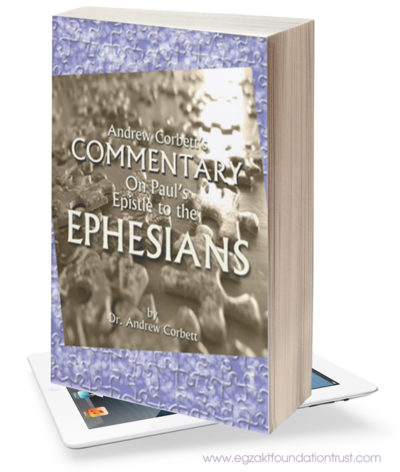
A Commentary On Paul’s Epistle To The Ephesians, eBook
$8.95 -
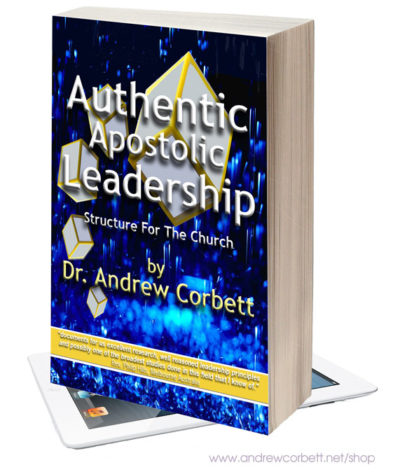
Authentic Apostolic Leadership, eBook
$18.95 -

Christian Witchcraft – Getting Things Wrong In Jesus’ Name
$5.95 -
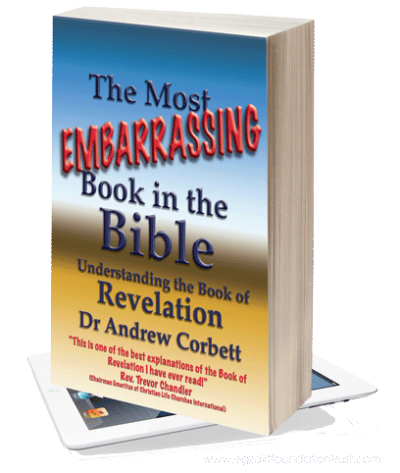
The Most Embarrassing Book In The Bible, eBook
$15.95 -
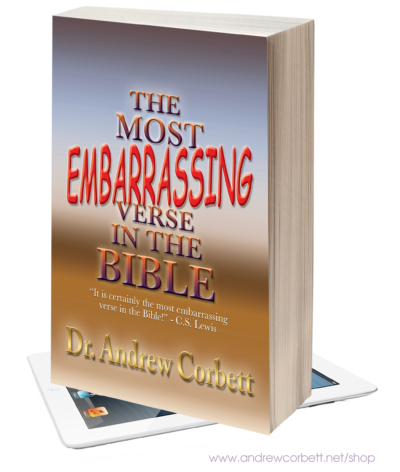
The Most Embarrassing Verse In The Bible, eBook
$6.95 -

Which Translation Can I Trust? eBook
$7.95





































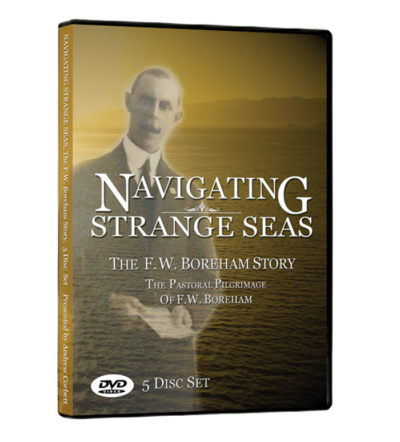
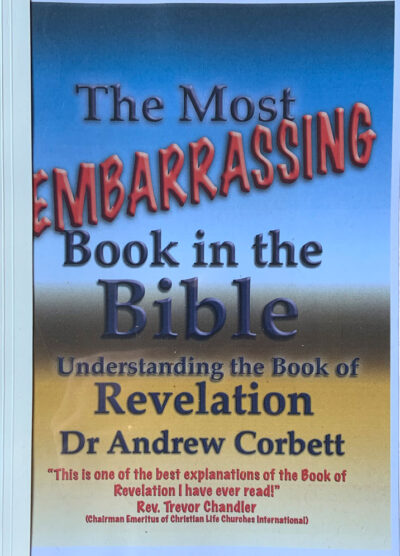
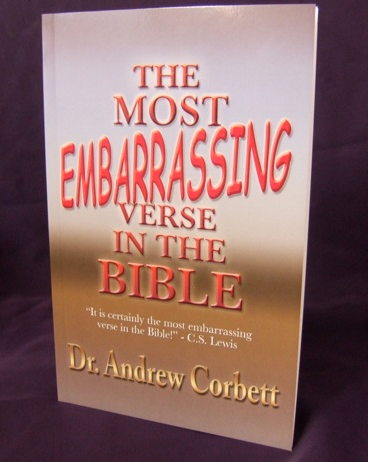

Archbishop Trench was a master on the Greek language.I have studied both Hebrew and Greek for many years. I accept Dr. Trench’s remarks on whether or not Christ knew when He was coming back.
When we read in Mark 13: 32 where it says ” … nor the Son , but the Father.” In Greek here it says : ” if not ” the Father. “Instead of our English: ” but the Father.” We now expand from the Greek and translate one concerning that day or the hour no human being knows;neither the Angels in heaven nor would the Son if He were not equal to the Father.” Jesus had said “I and my Father are one.”Jn. 10:30 “One” is neuter in Greek not masculine. Literally ‘one thing’ coequal in nature in all things including knowledge.
Paul says : “In Christ dwells all the treasures of wisdom and knowledge hidden away Gk. ” Col. 2:3 “All” is pantes or ‘every single thing’ so He knows everything!
Thank you Howard. Of course, the question isn’t whether Jesus knew He was ‘coming’ (as distinct from ‘returning’) but whether He knew when this would be. Your comment supports the argument I am making in this article that if Christ did not know when this was, then He could not reasonably claim equality with the Father. Thank you for your comment. Blessings.
A.C.
Hello, I have thought about this in the past and came to a solid conclusion that satisfies me, though it may not satisfy others. I do not believe that Jesus used His divine nature at all during the incarnation. I believe Jesus was our example and did everything through the Holy Spirit as we are to do. Jesus walked on water by the power of the Holy Spirit. Jesus controlled weather by the power of the Holy Spirit. Jesus knew the thoughts of others because the Holy Spirit revealed it to Him. The Holy Spirit, however, did not reveal to Jesus when His coming would be. That’s my understanding at least.
Thank you Aaron. The problem with this idea though, is that it not paints Jesus as ignorant, it also paints the Holy Spirit as similarly ignorant – if we claim that Jesus was ignorant (since, “only the Father knows” also precludes the Holy Spirit – and thereby undermines His deity as well).